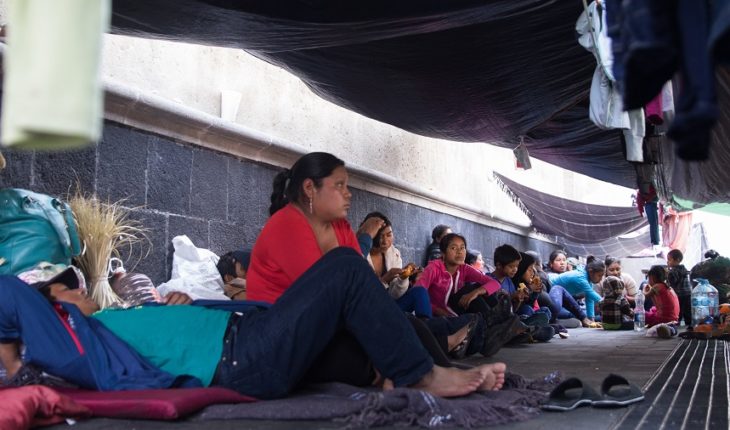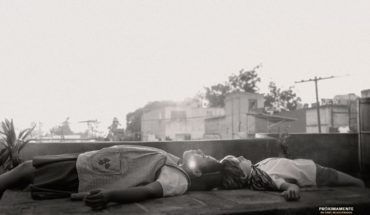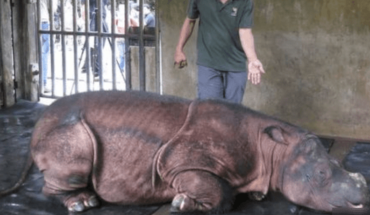Consuelo and her spouse Armando had an orchard of avocados, where it drew up to a ton of product twice per year; they had another of peaches, which had just make more large, and a small restaurant. They also planted poppy. They had built their House of cement in the community of Los Morros, in the municipality of Leonardo Bravo, in the Sierra de Guerrero.
She worked eight years in the United States, factories and hotels, and your spouse did the same for 14 years. They returned to Mexico because here they had left four daughters and had money to raise his heritage.
The elder were married shortly after the return of their parents, but consolation returned to be a mother at age 40. The girl was born with congenital hypothyroidism. Every day you should take medicines. Each month you need clinical trials. His parents invested part of what they earned in their health. In public services do not guarantee them neither proper medical tests and good care.
Despite that they were fine, things were going. Until they started disputes over territory between the organized crime groups who want to control the area of the entrance to the Sierra de Guerrero, where there are drugs and weapons, but also where bands can develop two more of their business: the collection of floor to the mining companies that seek to exploit the gold in the area, and the administration of its own mines.
The clashes caused shootings up to two or three times per week. “Sometimes we woke in the night, or started in the middle of the day and he had to run. We stand two years so, in this terror”, features comfort.
But the 11 November 2018 there was no option: run away or die. The criminal group today corridor controlling House green-Tlacotepec came by shooting at the edge of horse community. Witnesses of the fact told that they did not seem to be looking for some people at the rival band specific, entered by pulling on all sides.
“They were many, many, many.” Downloads of the machine-guns Din was heard. It was so strong, that we could barely hear each other. The communities below left running. Few reached to remove their cars”.
Most fled on foot. “The people of other villages, more down still, as El Naranjo, we began to help. They took their cars to take us to the municipal seat. Many were climbing at night, lamps, to rescue that had been left by the saw”, says comfort.
It wasn’t realized many people edge of horses died. There are several missing. “A neighbor has lost their son, who was leaving the school at that time that started it all, as to 1:30 in the afternoon of November 11.”
Some 1, 600 people from eight villages had to leave their homes that day. Many stayed in the Auditorium of Chichihualco, the head of the municipality of Leonardo Bravo. There they endured to the State Government to give them a response on their demands to withdraw the armed group. The response did not. The Governor did not give them even hearing.
Crammed into the Auditorium they learned that it had lost everything. Some of the displaced have the same history of comfort and your spouse: had gone to work in the United States to win well, save and then be able to return calm to their land. They had their orchards, businesses and houses of cement.
Although 80% of the population of the sierra de Guerrero also had additional work: the cultivation of poppy, an activity now in crisis, the drop in the price of opium gum, before the arrival in the United States of less expensive and more powerful synthetic drug market s.
Consuelo realized that the men who came to get them out of their villages razed yet. “They are very poor people. So they make their groups, go by the people of Tierra Caliente, which has nothing, and paid with what can be drawn from the houses”.
She and her spouse orchards will soon bear fruit. Peaches will be ready in June or July. But those who arrived to move them who will remain with the gain of the product, as they have been with homes, cars, furniture, clothing.
The trip to the capital and promises
After enduring nearly three months in the Auditorium of Chichihualco by a response from the State Government, a part of the displaced, about 400, including comfort, his daughter and his spouse, decided to travel to the city of Mexico, and hesitate to sit-in front of Palace National until the President Andrés Manuel López Obrador would give them audience. Not received them.
Who was in charge of addressing them was Alejandro Encinas, under-Secretary for human rights, population and migration of the Ministry of the Interior (Segob) and his team. Reach an agreement with them was not fast. “We think that we would be at camp about three or four days, believed that we would receive the President soon and that there would be a solution,” said Crescencio Pacheco, shifted from the field of aviation community, who has become one of the leaders and spokesperson of the group.
Read: Displaced people in Guerrero left sit-in in CDMX; SEGOB promises them protection to armed groups
But they had to spend 39 days outside National Palace to reach an agreement with holm oaks. During that time, only displaced people received support from organizations of civil society to resolve issues of food and water.
They had to “take” booths to get money and rent a few portable toilets that charged them thousand 600 pesos per day, and those who preferred to enter only when the bladder or intestine did not give more. Use, lack of water and the heat had them overwhelmed dirt and odor.
Everyone tried to occupy the time into something. Women set up a kitchen with tarps and organized the food donated by the civil society. He was appointed Brigade for cooking for the week. Cook for 400 people was heavy, but was worse when they didn’t have to comply with that order and then there was nothing to do all day.
The children, about 70 in total, entertained at times running from one side to the other, but then tiredness and boredom had them staying still, just looking, as adults. Played men get money, in kennels or in collections down the street.
It was until March 27 when the displaced persons and the Under-Secretary of the Interior signed an agreement, with the first condition that lifted the sit-in and return to the Auditorium of Chichihualco, in the city of Leonardo Bravo. The next day the settlers raised their clothes, mattresses and tents and went.
They fulfilled their part. The Government has done very half. This agreement established that during the first month of return would be a census among the displaced to find ages and profiles, and join them to the social programs of the federal Government. The Executive Committee of care to victims (CEAV) was in charge of raising it and is already completed.
It was also agreed that authorities assume the rent of houses so displaced families did not have to go on living in the municipal Auditorium, as organised security for the return to their communities strategy.
The houses are already rented, but were themselves displaced persons who had to get to pay for them, because the Government has not transferred them. The compromise is that they will do it later this month or early May.
“I also understand that paperwork to collect complaints from those affected by dispossession and papers to check the lease of dwellings and organize the same census that was done is not easy,” says Manuel Olivares, director of the Regional Center of Rights human José María Morelos y Pavón (Center Morelos), who has been giving support to the settlers.
For it which do not find much justification is for breach of another commitment signed in agreement with the Secretariat for human rights, of Segob: the establishment of a security perimeter for the displaced, with three points of surveillance towards the sierra and Chilpancingo: in el Naranjo, el Carrizal and the breaker, routes where the armed group that displaced them could enter where you would like to attack them.
“These surveillance points were not established. Only you have been doing patrulleos in the sierra. What we were told is that they were seeing it with the Secretary for security to see if they were necessary because there are already enough presence of soldiers. But for now this part of the agreement has not been fulfilled,”warns Pacheco.
Economic problems
Consuelo and his spouse had to find a room to rent. The Government determined that displaced persons had to find a place to live, installed and then deposits would be for three months of rent.
“With what we had left over from the ‘shots’ of the booths in the city of Mexico cover a month’s rent.” We got that the landlord would enable us to pay you a deposit then. Now, later on 12 may we have to pay that and the second month of rent, hope to get the money they promised the Government before that date,”says Consuelo.
Lady aware that fifteen days ago came to visit them Neftali Granados, the person Holm appointed as liaison between the Secretariat for human rights and they. “We already did everything they told us, we already went to rent, already deliver the Auditorium of Chichihualco where we were. I already did all the paperwork that we were told. We were asked to create an account in Banco Azteca or Serfin to receive deposits, like that of Serfin has”ce that we don’t see it, everyone went to Banco Azteca by the counts”.
Concerned about comfort, in addition to income, unable to make her youngest daughter medical studies that need and not be able to provide your medication. That has been their main trouble during these months. “As we lost everything: home, work, belongings, because we don’t have to pay attention to the girl.” On May 6, you have your inquiry at the General Hospital, but I take it with thyroid profile already made, and in the public service do not is never full no sooner. And now we don’t have to pay for a private one.”
Consuelo says she, like all displaced persons, only wants a temporary job, while they may return to their community, where they know they will have to start everything from scratch. “Already we are asking the Secretary of Government of Guerrero to help us to get a job, because here it is difficult, but even sweeping the streets, collecting garbage, no matter, us we do not want to be stretching the hand, we want to work to have our “money, that we are accustomed”.
But what they really want is to go home, and the federal Government promised them they could do so three months after signed the agreement with Alejandro Encinas. “We have been almost one. We leave the encampment in the city of Mexico, on 28 March, so it is now for the first month. They are two. Although now that it came Neftali Granados told us that to pacify the area and we could go back would take six months, but that was not the agreement, and if they do not comply, we will meet again to mobilize”, warns Roberto, displaced horses edge community.
Thanks for reading! Help us to continue with our work. How? You can now subscribe to political Animal on Facebook. With your monthly donation, you will receive special content. Find out how to subscribe here. Check our list of frequently asked questions here.





